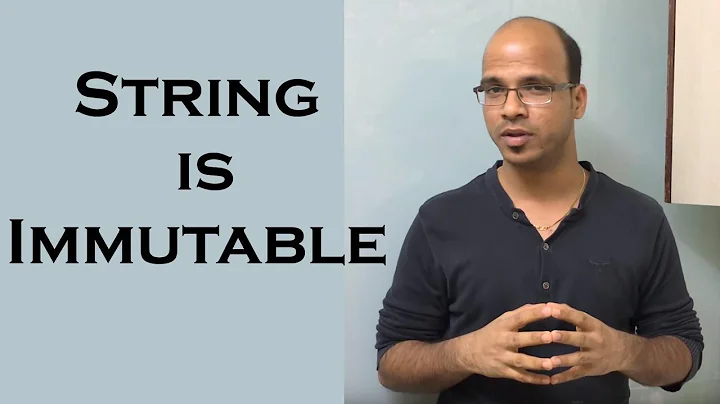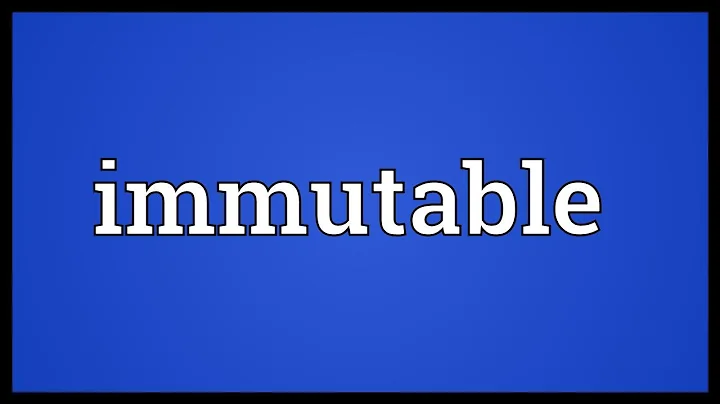What does immutable mean?
Solution 1
It means that once you instantiate the object, you can't change its properties. In your first alert you aren't changing foo. You're creating a new string. This is why in your second alert it will show "foo" instead of oo.
Does it mean, when calling methods on a string, it will return the modified string, but it won't change the initial string?
Yes. Nothing can change the string once it is created. Now this doesn't mean that you can't assign a new string object to the str variable. You just can't change the current object that str references.
If the string was mutable, does that mean the 2nd alert() would return oo as well?
Technically, no, because the substring method returns a new string. Making an object mutable, wouldn't change the method. Making it mutable means that technically, you could make it so that substring would change the original string instead of creating a new one.
Solution 2
On a lower level, immutability means that the memory the string is stored in will not be modified. Once you create a string "foo", some memory is allocated to store the value "foo". This memory will not be altered. If you modify the string with, say, substr(1), a new string is created and a different part of memory is allocated which will store "oo". Now you have two strings in memory, "foo" and "oo". Even if you're not going to use "foo" anymore, it'll stick around until it's garbage collected.
One reason why string operations are comparatively expensive.
Solution 3
Immutable means that which cannot be changed or modified.
So when you assign a value to a string, this value is created from scratch as opposed to being replaced. So everytime a new value is assigned to the same string, a copy is created. So in reality, you are never changing the original value.
Solution 4
I'm not certain about JavaScript, but in Java, strings take an additional step to immutability, with the "String Constant Pool". Strings can be constructed with string literals ("foo") or with a String class constructor. Strings constructed with string literals are a part of the String Constant Pool, and the same string literal will always be the same memory address from the pool.
Example:
String lit1 = "foo";
String lit2 = "foo";
String cons = new String("foo");
System.out.println(lit1 == lit2); // true
System.out.println(lit1 == cons); // false
System.out.println(lit1.equals(cons)); // true
In the above, both lit1 and lit2 are constructed using the same string literal, so they're pointing at the same memory address; lit1 == lit2 results in true, because they are exactly the same object.
However, cons is constructed using the class constructor. Although the parameter is the same string constant, the constructor allocates new memory for cons, meaning cons is not the same object as lit1 and lit2, despite containing the same data.
Of course, since the three strings all contain the same character data, using the equals method will return true.
(Both types of string construction are immutable, of course)
Solution 5
The text-book definition of mutability is liable or subject to change or alteration. In programming, we use the word to mean objects whose state is allowed to change over time. An immutable value is the exact opposite – after it has been created, it can never change.
If this seems strange, allow me to remind you that many of the values we use all the time are in fact immutable.
var statement = "I am an immutable value";
var otherStr = statement.slice(8, 17);
I think no one will be surprised to learn that the second line in no way changes the string in statement. In fact, no string methods change the string they operate on, they all return new strings. The reason is that strings are immutable – they cannot change, we can only ever make new strings.
Strings are not the only immutable values built into JavaScript. Numbers are immutable too. Can you even imagine an environment where evaluating the expression 2 + 3 changes the meaning of the number 2? It sounds absurd, yet we do this with our objects and arrays all the time.
Related videos on Youtube
user3167101
I like to make stuff. Check out my blog. You can email me at alex at my domain. My dotfiles, if you're curious :)
Updated on July 08, 2022Comments
-
user3167101 almost 2 years
If a string is immutable, does that mean that.... (let's assume JavaScript)
var str = 'foo'; alert(str.substr(1)); // oo alert(str); // fooDoes it mean, when calling methods on a string, it will return the modified string, but it won't change the initial string?
If the string was mutable, does that mean the 2nd
alert()would returnooas well? -
 Admin almost 14 yearsThat quote contains an odd claim - that stack data structure (actually multiple stacks with tail-sharing) is, as a whole, a mutable structure - every push or pop changes the structure. Only the individual items are immutable. And in principle, you could have the same structure but with mutable elements. This happens in some variations of undoable union-find IIRC. Immutability has big advantages, but sharing part or all of a data structure as an optimisation is perfectly possible with mutables. Even if you want apparent immutability for other references, you can always copy-on-write as needed.
Admin almost 14 yearsThat quote contains an odd claim - that stack data structure (actually multiple stacks with tail-sharing) is, as a whole, a mutable structure - every push or pop changes the structure. Only the individual items are immutable. And in principle, you could have the same structure but with mutable elements. This happens in some variations of undoable union-find IIRC. Immutability has big advantages, but sharing part or all of a data structure as an optimisation is perfectly possible with mutables. Even if you want apparent immutability for other references, you can always copy-on-write as needed. -
Ashwin G about 9 yearsThe same string if modified and assigned, will update the string var str = 'foo'; str = str.substr(1)); // oo alert(str); // oo
-
 RN Kushwaha almost 9 yearsNumbers are immutable too.
RN Kushwaha almost 9 yearsNumbers are immutable too. -
zerkms almost 9 yearshello from 2015!! "On a lower level, immutability means that the memory the string is stored in will not be modified. " --- this is too restrictive and does not sound right. Immutability is only about userland, the virtual memory may be changed as memory allocator likes as soon as language specification invariants are kept.
-
 Ejaz Karim almost 8 yearsThis answer is more logical than the accepeted answer.
Ejaz Karim almost 8 yearsThis answer is more logical than the accepeted answer. -
Santosh over 7 yearsWhat about below code. The string value is changed now. var name = "Santosh"; console.log(name.substr(0,2)); var name = "kumar" console.log(name); How its still immutable
-
Hacker over 6 yearsBut i can do like var str = 'foo'; i can modify via str = 'bar'. str value got modified this way right?
-
Gromski over 6 years@Hacker Nope. You've assigned a new string to the variable pointing to a new location in memory.
-
Hacker over 6 years@deceze - Got it. Old value will be still in memory.







